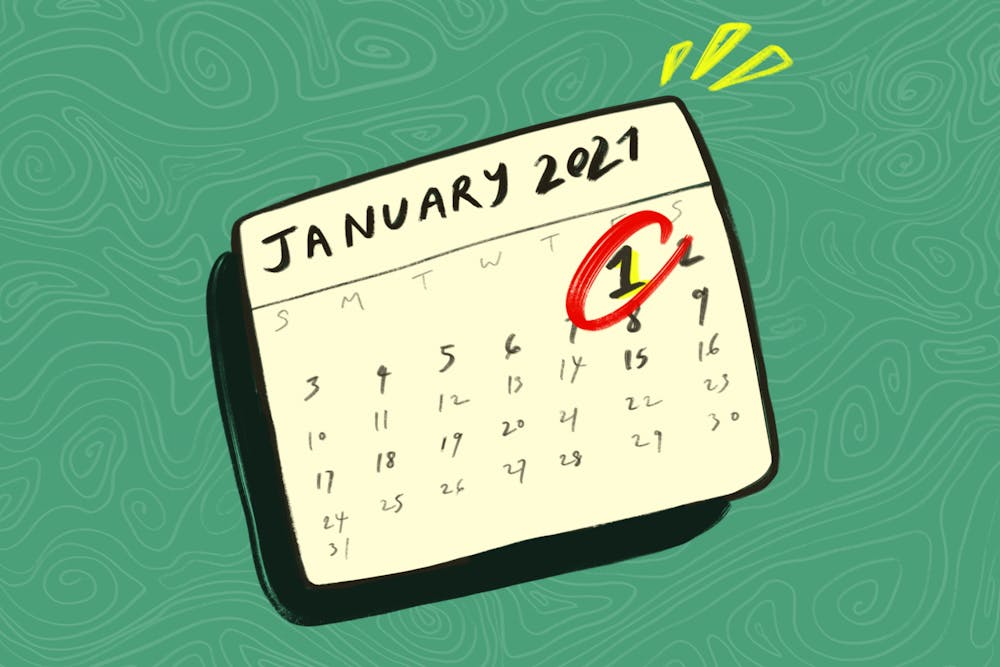
Congratulations: you made it to the end of 2020! It was difficult; maybe it was even the most difficult year of your life, but you did it, and that’s certainly commendable. Reading this might be the first time you have even considered being proud of the accomplishment of just surviving this year, and if that’s the case, you are not alone.
Humans are prone to a negativity bias, a sort of psychological filter that makes us forget the positive moments that we experience, and forces us to constantly recall the ones that sting. For example, if I ask you to list something that you did yesterday you were proud of, you might take a couple minutes to come up with something. Though, if I ask you to recall an embarrassing moment from your childhood, I’m sure you would identify a mortifying old memory within seconds.
Evolutionarily, this negativity bias serves a purpose: prehistoric Homo sapiens were better off if they remembered the one time their neighbor was killed by a lion because it would make them a little extra cautious on the next hunt. A bout of diarrhea after eating the fruit from a particular tree would remind you to steer clear of it next time, potentially saving your life. Even today, a negativity bias can be a valuable asset. Hearing about a COVID infection within your friend group or extended family rightly spooks you into wearing a mask more often and thinking twice about attending an event – at least in theory.
Where the negativity bias fails us is when it ceases to simply highlight those individual moments and begins to tint our entire worldview. During a chronically stressful event – a global pandemic, for example – our innate negativity bias has a nearly nonstop supply of bleak situations of which to remind us. The everyday wins that make us feel good in the moment ultimately get lost in the whirlwind.
Instinctually, you would think the best way to avoid this bias is by forcing ourselves to focus on the positives. But attempting to eliminate negativity from our lives only buries it and allows it to resurface. Shutting out negativity does an injustice to the tremendous amount of suffering that deserves acknowledgement. COVID-19 and our government’s insufficient response has killed hundreds of thousands of people nationwide. Moreover, this year has brought waves of natural disasters and heartbreaking partisanship over the simple acknowledgement that Black lives (do) matter. There could be personal devastation in your own life. Perhaps you or a close family member fell ill. Maybe you were unable to meet academic or professional goals after the disruption of the past two semesters. Maybe you couldn’t sustain a relationship or friendship after moving back home. These are real losses that should be grieved, not ignored.
A more sustainable approach to navigating the future is building resilience. This doesn’t mean fighting the adversity and hating it, it means accepting and working with it.
A common statement I’ve been hearing over the past couple of months is some form of, “I can’t wait for 2020 to be over,” the spoken equivalent of kicking the door of a locked safe. January 1, 2021 is not going to bring radical change. It’s going to look and feel exactly the same as December 31, 2020. Realistically, the start of 2021 is going to have the same troubles as 2020, given that vaccine distribution is likely to take months, and the winter weather will undoubtedly bring unprecedented sickness. Wishing for the year to be over, even if only in jest, inevitably sets us up for disappointment.
In 2011, Dr. Martin Seligman, the Director of Penn’s Positive Psychology Center, wrote that the key to building resilience involves separating your beliefs about adversity from adversity itself. In other words, you had certain expectations about what the year ought to have looked like, and if you compare present-you to the expectations of past-you, you almost certainly missed the mark on all accounts. But is that comparison really fair?
I’m here to tell you that if you think you coped with 2020 poorly, you didn’t. You still showed up to Zoom class even though it was hard. You managed to get up every morning and do what you needed to do, even though you were probably isolated from friends and family. Your 2020 was difficult and probably full of fear and sadness, but it was still a success. If you search hard enough, I guarantee you will find many ways in which you managed to move forward despite the circumstances. The longer you think about your accomplishments in the context of the year, I promise you’ll feel better about where you are.
Eventually, the pandemic will conclude, but that doesn’t mean you have to lose the resilience you built over the past year. We’re always going to face adversity, but knowing how to separate your beliefs about adversity from adversity itself can allow you to deal with almost anything. The thing about resilience is that we all have the potential for it, as long as we have the right mindset.

VARUN SARASWATHULA is a College junior from Herndon, V.A. studying Neuroscience and Healthcare Management. His email is vsaras@sas.upenn.edu.
The Daily Pennsylvanian is an independent, student-run newspaper. Please consider making a donation to support the coverage that shapes the University. Your generosity ensures a future of strong journalism at Penn.
Donate






